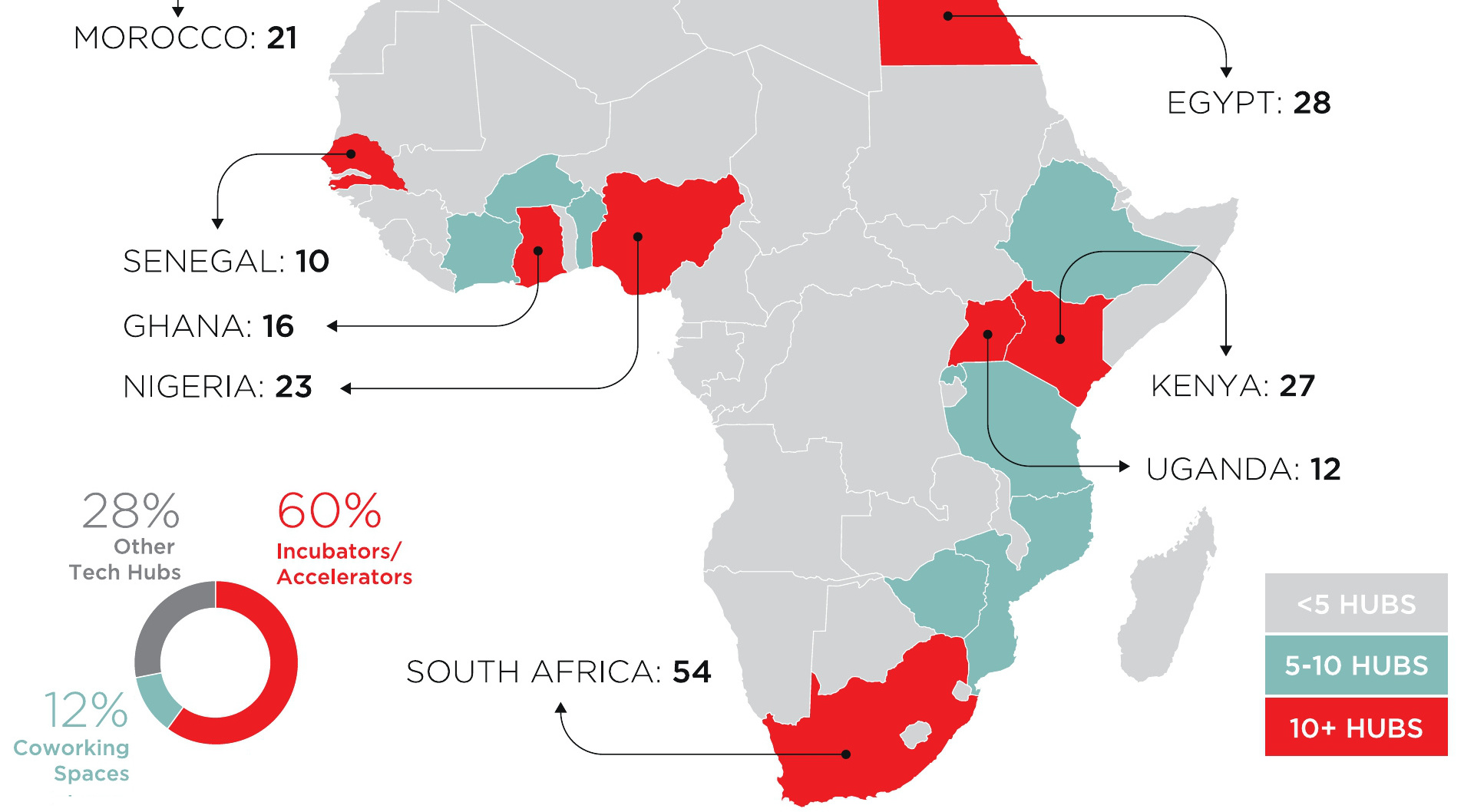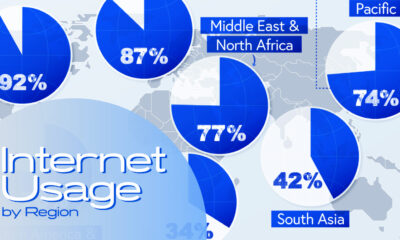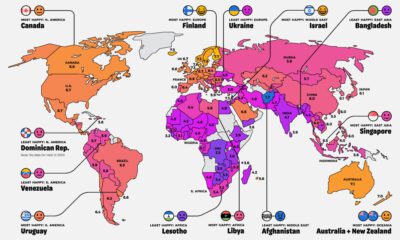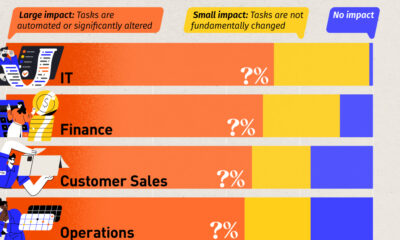Technology
Africa’s Exploding Tech Startup Ecosystem
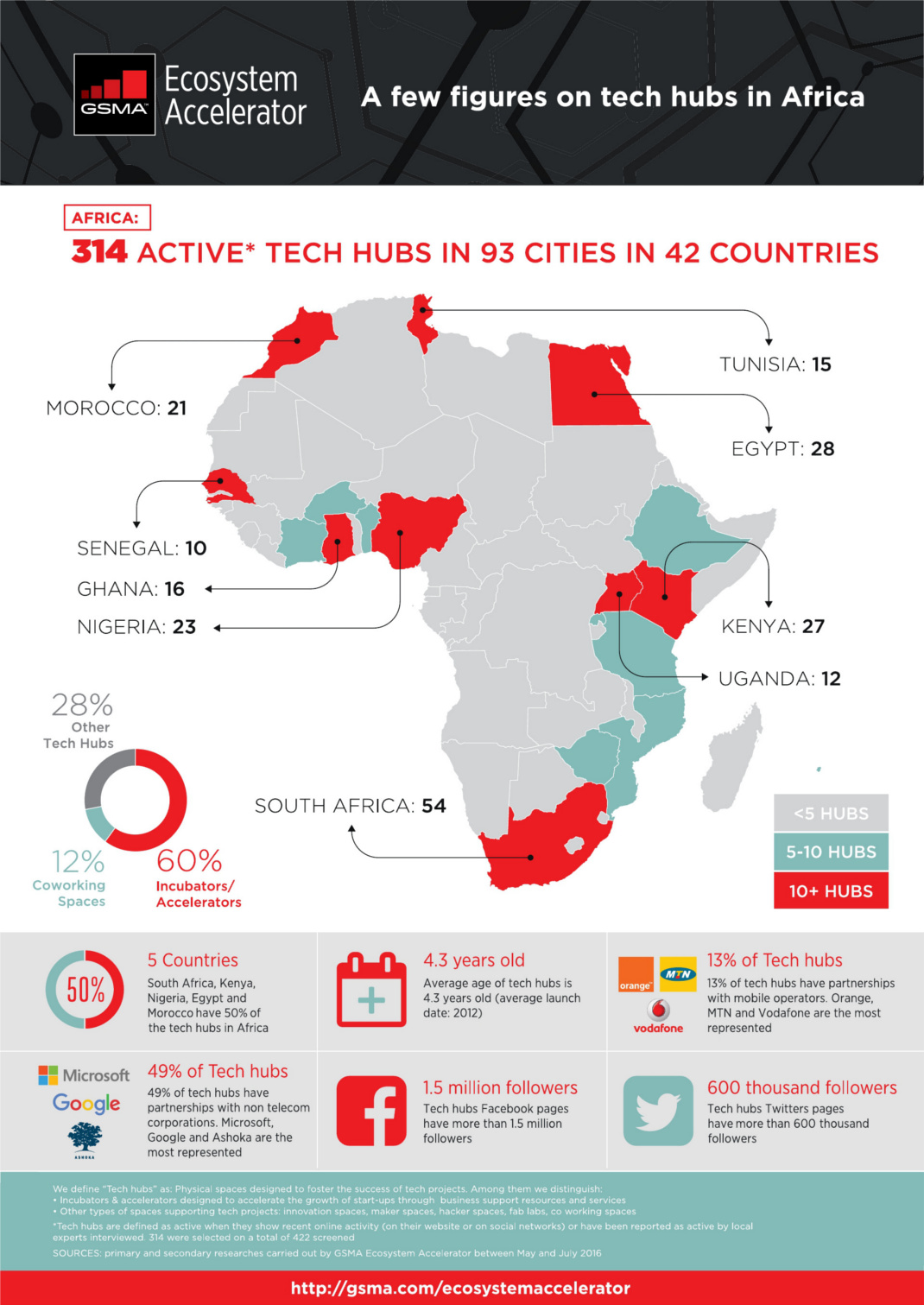
Africa’s Exploding Tech Startup Ecosystem
In terms of economic potential and growth, Africa has never been more important on the world stage.
Africa is home to the fastest growing cities, and more than half of the world’s population growth will take place on the continent over the coming decades. By 2050, cities like Lagos and Kinshasa will be global megacities, each holding well over 30 million inhabitants.
Africa is also at the start of a technological renaissance. It was recently reported by WeAreSocial that 7 of 10 of the world’s fastest growing internet populations are in Africa – the beginning of a trend that will likely re-shape entire economies as new companies leapfrog established technology, ideas, and infrastructure.
That said, much of that opportunity lies in the future. As of today, internet penetration is just 29% throughout Africa, meaning that the majority of growth and network effects are still to come.
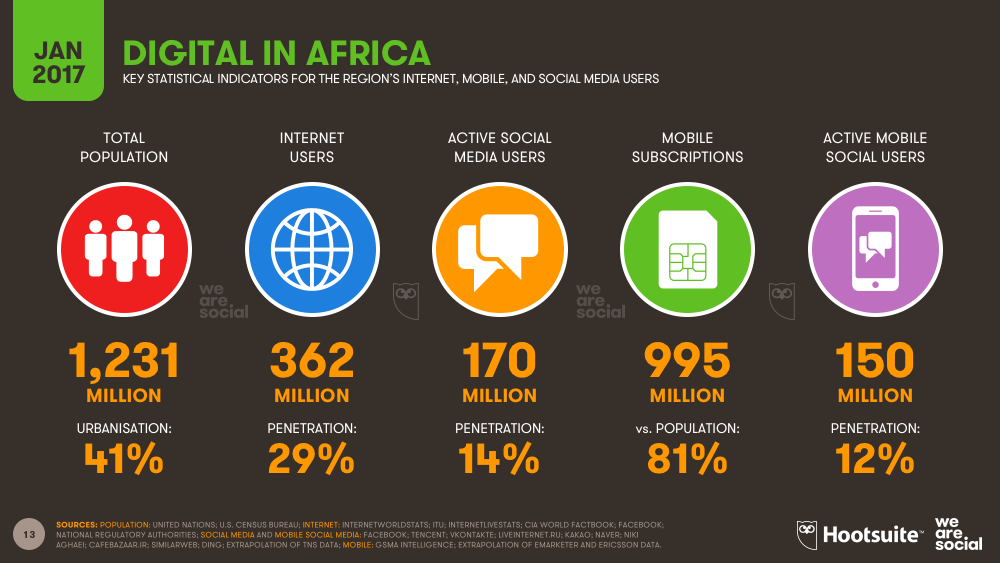
A New Startup Ecosystem Emerges
Today’s infographic from GSMA shows the 300+ hubs that have emerged in the African tech startup ecosystem. Many of these plan to take advantage of the aforementioned growth potential, including the 360 million smartphone owners expected on the continent by 2025.
Investors are recognizing the potential as well. Last year, it was estimated that African startups raised a record-breaking total of $366.8 million in investment.
Here’s that distribution sorted by country:
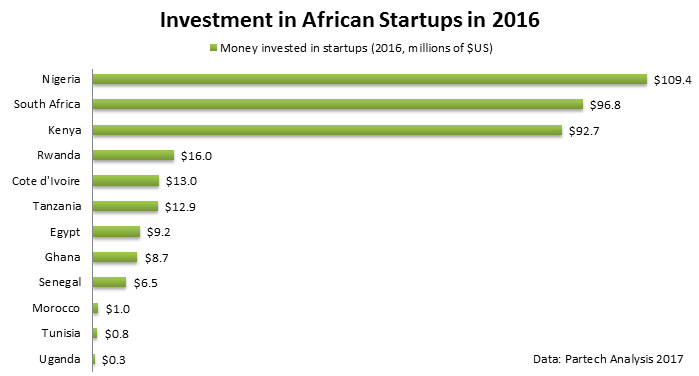
In what sectors did most of the action happen? According to a separate report by Disrupt Africa, the fintech sector received the most funding in 2016, but the agri-tech sector saw the biggest percentage growth as compared to the previous year.
Other sectors that got substantial amounts of attention include solar, health, e-commerce, entertainment, and e-learning.
Unique Opportunities
Every startup ecosystem is different, and hubs in Africa are no exception.
In particular, the continent has a unique wrinkle that also presents a huge opportunity: according to the African Development Bank, about 55% of sub-Saharan Africa’s economic activity is informal.
The [informal economy] is a massive commercial space without such services as business enterprise software, small business banking, affordable third-party logistics or internet access. Expect VC-backed startups to attempt scalable applications for nearly every corner of Africa’s informal economy.
– Jake Bright, World Economic Forum
Last year, Africa Internet Group became the first unicorn on the continent after receiving investments from Goldman Sachs, Rocket Internet, AXA Group, Orange, and others.
It’s also certain to be just one of many born on the African Savannah.
Technology
Ranked: Semiconductor Companies by Industry Revenue Share
Nvidia is coming for Intel’s crown. Samsung is losing ground. AI is transforming the space. We break down revenue for semiconductor companies.
Semiconductor Companies by Industry Revenue Share
This was originally posted on our Voronoi app. Download the app for free on Apple or Android and discover incredible data-driven charts from a variety of trusted sources.
Did you know that some computer chips are now retailing for the price of a new BMW?
As computers invade nearly every sphere of life, so too have the chips that power them, raising the revenues of the businesses dedicated to designing them.
But how did various chipmakers measure against each other last year?
We rank the biggest semiconductor companies by their percentage share of the industry’s revenues in 2023, using data from Omdia research.
Which Chip Company Made the Most Money in 2023?
Market leader and industry-defining veteran Intel still holds the crown for the most revenue in the sector, crossing $50 billion in 2023, or 10% of the broader industry’s topline.
All is not well at Intel, however, with the company’s stock price down over 20% year-to-date after it revealed billion-dollar losses in its foundry business.
| Rank | Company | 2023 Revenue | % of Industry Revenue |
|---|---|---|---|
| 1 | Intel | $51B | 9.4% |
| 2 | NVIDIA | $49B | 9.0% |
| 3 | Samsung Electronics | $44B | 8.1% |
| 4 | Qualcomm | $31B | 5.7% |
| 5 | Broadcom | $28B | 5.2% |
| 6 | SK Hynix | $24B | 4.4% |
| 7 | AMD | $22B | 4.1% |
| 8 | Apple | $19B | 3.4% |
| 9 | Infineon Tech | $17B | 3.2% |
| 10 | STMicroelectronics | $17B | 3.2% |
| 11 | Texas Instruments | $17B | 3.1% |
| 12 | Micron Technology | $16B | 2.9% |
| 13 | MediaTek | $14B | 2.6% |
| 14 | NXP | $13B | 2.4% |
| 15 | Analog Devices | $12B | 2.2% |
| 16 | Renesas Electronics Corporation | $11B | 1.9% |
| 17 | Sony Semiconductor Solutions Corporation | $10B | 1.9% |
| 18 | Microchip Technology | $8B | 1.5% |
| 19 | Onsemi | $8B | 1.4% |
| 20 | KIOXIA Corporation | $7B | 1.3% |
| N/A | Others | $126B | 23.2% |
| N/A | Total | $545B | 100% |
Note: Figures are rounded. Totals and percentages may not sum to 100.
Meanwhile, Nvidia is very close to overtaking Intel, after declaring $49 billion of topline revenue for 2023. This is more than double its 2022 revenue ($21 billion), increasing its share of industry revenues to 9%.
Nvidia’s meteoric rise has gotten a huge thumbs-up from investors. It became a trillion dollar stock last year, and broke the single-day gain record for market capitalization this year.
Other chipmakers haven’t been as successful. Out of the top 20 semiconductor companies by revenue, 12 did not match their 2022 revenues, including big names like Intel, Samsung, and AMD.
The Many Different Types of Chipmakers
All of these companies may belong to the same industry, but they don’t focus on the same niche.
According to Investopedia, there are four major types of chips, depending on their functionality: microprocessors, memory chips, standard chips, and complex systems on a chip.
Nvidia’s core business was once GPUs for computers (graphics processing units), but in recent years this has drastically shifted towards microprocessors for analytics and AI.
These specialized chips seem to be where the majority of growth is occurring within the sector. For example, companies that are largely in the memory segment—Samsung, SK Hynix, and Micron Technology—saw peak revenues in the mid-2010s.
-

 Misc2 weeks ago
Misc2 weeks agoTesla Is Once Again the World’s Best-Selling EV Company
-

 AI1 week ago
AI1 week agoThe Stock Performance of U.S. Chipmakers So Far in 2024
-

 Misc1 week ago
Misc1 week agoAlmost Every EV Stock is Down After Q1 2024
-

 Money2 weeks ago
Money2 weeks agoWhere Does One U.S. Tax Dollar Go?
-
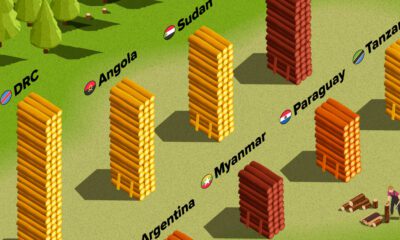
 Green2 weeks ago
Green2 weeks agoRanked: Top Countries by Total Forest Loss Since 2001
-
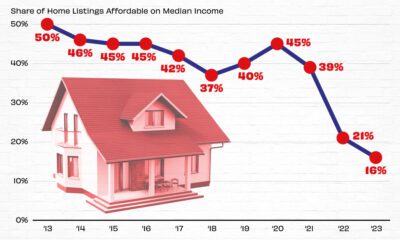
 Real Estate2 weeks ago
Real Estate2 weeks agoVisualizing America’s Shortage of Affordable Homes
-
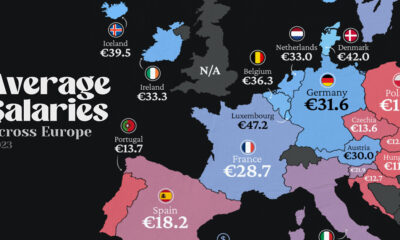
 Maps2 weeks ago
Maps2 weeks agoMapped: Average Wages Across Europe
-

 Mining2 weeks ago
Mining2 weeks agoCharted: The Value Gap Between the Gold Price and Gold Miners

